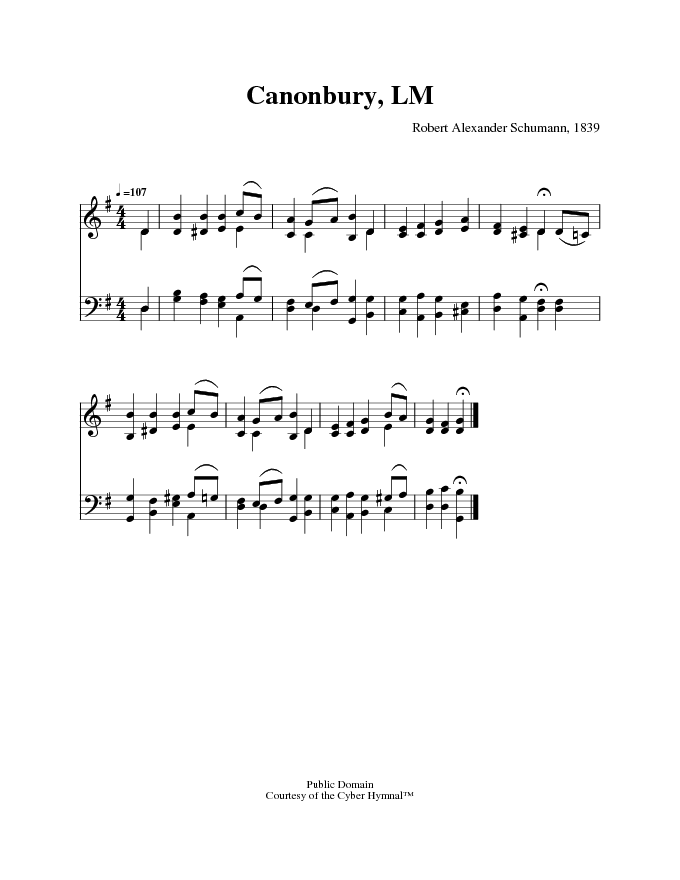- |
User Links
| 1855 | The Cyber Hymnal#1856 | 1857 |
| Text: | Glory to God, Whose Sovereign Grace |
| Author: | Charles Wesley |
| Tune: | CANONBURY |
| Composer: | Robert Alexander Schuman |
| Media: | MIDI file |
1856. Glory to God, Whose Sovereign Grace
1. Glory to God, whose sovereign grace
Hath animated senseless stones;
Called us to stand before His face,
And raised us into Abraham’s sons!
2. The people that in darkness lay,
In sin and error’s deadly shade,
Have seen a glorious gospel day,
In Jesus’ lovely face displayed.
3. Thou only, Lord, the work hast done,
And bared Thine arm in all our sight;
Hast made the reprobates Thine own,
And claimed the outcasts as Thy right.
4. Thy single arm, almighty Lord,
To us the great salvation brought,
Thy Word, Thy all-creating Word,
That spake at first the world from naught.
5. For this the saints lift up their voice,
And ceaseless praise to Thee is giv’n;
For this the hosts above rejoice,
We raise the happiness of Heav’n.
6. For this, no longer sons of night,
To Thee our thankful hearts we give;
To Thee, who called us into light,
To Thee we die, to Thee we live.
7. Suffice that for the season past
Hell’s horrid language filled our tongues,
We all Thy words behind us cast,
And lewdly sang the drunkard’s songs.
8. But, O the power of grace divine!
In hymns we now our voices raise,
Loudly in strange hosannas join,
And blasphemies are turned to praise!
| Text Information | |
|---|---|
| First Line: | Glory to God, whose sovereign grace |
| Title: | Glory to God, Whose Sovereign Grace |
| Author: | Charles Wesley (1740) |
| Meter: | LM |
| Language: | English |
| Source: | Hymns and Sacred Poems, 1740 |
| Copyright: | Public Domain |
| Notes: | On August 31, 1739, [Wesley's] Journal says, 'I spoke to the poor colliers on The blind receive their sight, the lame walk, &c.' On Tuesday, September 4, he 'preached over against the school in Kingswood, to some thousands (colliers chiefly [see the last two verses, written with this audience in mind]), and held out the promises, from Isa. xxxv.: The wilderness and the solitary place shall be glad for them; and the desert shall rejoice, and blossom as the rose. I triumphed in God's mercy to these poor outcasts (for He hath called them a people who were not a people), and in the accomplishment of that scripture, Then the eyes of the blind shall be opened, &c. Oh, how gladly do the poor receive the gospel! We hardly knew how to part.' When Whitefield told his friends in Bristol that he was going to America to preach to savages, they replied, 'What need of going abroad for this? Have we not Indians enough at home? If you want to convert Indians, there are colliers enough at Kingswood.' Telford, p. 237. Alternate tune: CHURCH TRIUMPHANT, James W. Elliott, 1874 |
| Tune Information | |
|---|---|
| Name: | CANONBURY |
| Composer: | Robert Alexander Schuman (1839, adapted) |
| Meter: | LM |
| Incipit: | 53334 32123 56712 |
| Key: | G Major |
| Source: | Nachtstück, Opus 23, No. 4, by Robert A. Schumann, 1839 |
| Copyright: | Public Domain |
| Media | |
|---|---|
| Adobe Acrobat image: | (Cyber Hymnal) |
| MIDI file: | (Cyber Hymnal) |
| Noteworthy Composer score: | (Cyber Hymnal) |
| XML score: | |


 My Starred Hymns
My Starred Hymns



